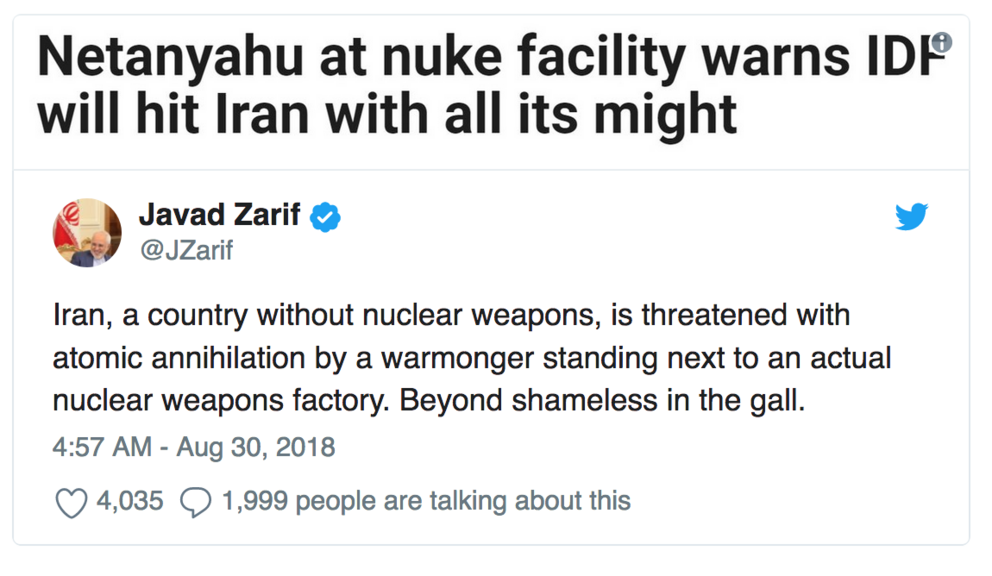Netanyahu says IDF will hit Iranian forces in Syria with “all its might”
... speaking in front of Israel’s nukes
“Iran, a country without nuclear weapons, is threatened with atomic annihilation by a warmonger standing next to an actual nuclear weapons factory.” — Iranian Foreign Minister Mohammad Javad Zarif
TEL AVIV, ISRAEL – During a ceremony at an Israeli nuclear-weapons development center, Israeli Prime Minister Benjamin Netanyahu delivered a speech in which he stated that the Israeli Defense Forces (IDF) would act with “all its might” against Iranian military assets in Syria, and that Israel would oppose Iran’s presence in Syria with the same “determination” it used to push the United States to withdraw from the Iranian nuclear deal, also known as the Joint Comprehensive Plan of Action (JCPOA).
In “working to prevent Iranian military entrenchment in Syria,” Netanyahu asserted:
[The IDF] will continue to act with total determination and all its might against attempts by Iran to station troops and advanced weapons in Syria, and no agreement between Syria and Iran will scare us, nor will any threat scare us.”
The Israeli PM’s statement is an apparent reference to the signing of a new military cooperation agreement between Syria and Iran on Monday, which will see the presence of Iranian military advisors in Syria continue, among other provisions.
Netanyahu subsequently added that “anyone who threatens us with annihilation will find himself under the same threat, and they won’t succeed anyway.”
Iranian Foreign Minister Mohammad Javad Zarif commented on Netanyahu’s threats of “annihilation,” stating via Twitter:

Zarif went on to call the Israeli PM’s statements “beyond shameless.”
“The weak crumble . . . only the strong survive”
The location at which Netanyahu chose to deliver his hawkish statements is no coincidence, as the Dimona nuclear facility, now renamed after former Israeli Prime Minister Shimon Peres following Wednesday’s ceremony, is allegedly where Israel has developed an estimated 100 to 200 nuclear weapons, making it the only Middle Eastern country with atomic weapons.
However, that status may soon change as Israel has begun aiding Saudi Arabia to acquire the ability to domestically manufacture nuclear weapons, one manifestation of the deepening ties between the two countries.
Netanyahu referenced this new alliance on Wednesday when he spoke of how Israel’s status as the region’s only nuclear power was part of a plan leading to the “normalization between core countries in the Arab world and a strong State of Israel,” which is now “happening before our very eyes, on a scale that would have been impossible to imagine just a few years ago.”
Netanyahu made it clear that progress on this front is the result of Israel’s new position of strength, rooted not merely in Israel’s nuclear arsenal but also in the strong pro-Israel bias of the U.S. government under Donald Trump. Speaking of Israel’s strength in the region, Netanyahu then opined that the Middle East is “no place for the weak:”
The weak crumble, are slaughtered and are erased from history while the strong, for good or for ill, survive. The strong are respected, and alliances are made with the strong, and in the end peace is made with the strong.”
Netanyahu’s timing keyed to Idlib and end of Syrian internal strife
It is also worth noting the fact that Netanyahu’s comments focus on Iran’s military presence in Syria — which is comprised of military advisors, not ground troops. This concern about Iran in Syria has often been cited by Israel as justification for its numerous airstrikes within Syria, targeting Syrian government facilities and military installations despite the relatively small number of Iranian military personnel present in the country.
Netanyahu’s comments regarding Iran in Syria come at a crucial juncture in the Syrian conflict, as the Syrian military and its allies seek to begin a major military offensive against the final remaining stronghold of opposition “rebels” in the Idlib province, who are dominated by Syria’s Al Qaeda affiliate, al-Nusra Front.
The upcoming offensive has prompted U.S. officials to warn of a possible escalation targeting Syrian forces if Syria is merely accused by Idlib rebels of using chemical weapons. Prior to such statements, the Trump administration had warned that the U.S. would not end its occupation of northeastern Syria until the “Iranian menace” was removed from the country.
Thus, Netanyahu’s speech seems similarly aimed at setting the stage for an Israeli escalation in Syria, with Iran serving as the justification for Israel’s long-standing goal of toppling the Syrian government.

